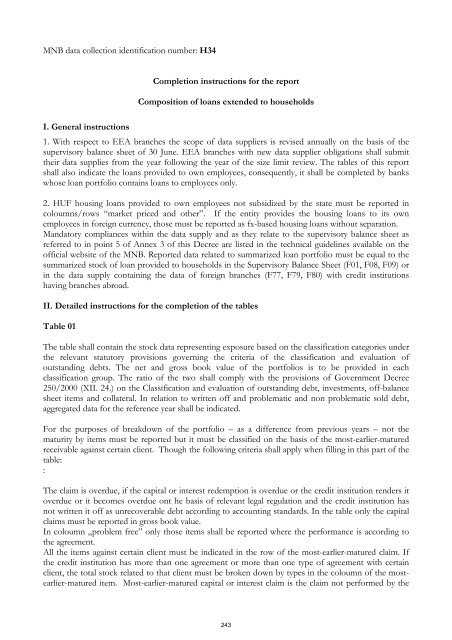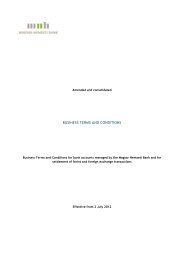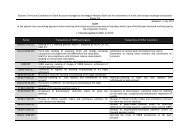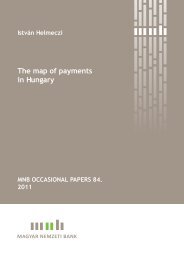- Page 1 and 2:
Decree No. 32/2009 (XII.1.) of the
- Page 3 and 4:
Identifica tion code E14 E20 E21 E2
- Page 5 and 6:
Identifica tion code E61 E62 E64 F0
- Page 7 and 8:
Identifica tion code F19 F20 F21 F2
- Page 9 and 10:
Identifica tion code F79 F80 F81 F8
- Page 11 and 12:
Identifica tion code F97 F98 H01 H0
- Page 13 and 14:
Identifica tion code P07 P26 P27 P3
- Page 15 and 16:
Identifica tion code P50 P51 R01 De
- Page 17 and 18:
Identifica tion code R06 R07 R08 R0
- Page 19 and 20:
Identifica tion code R13 Descriptio
- Page 21 and 22:
Identifica tion code R16 R17 Descri
- Page 23 and 24:
Identifica tion code R20 R21 R22 R2
- Page 25 and 26:
Identifica tion code R29 R38 R39 De
- Page 27 and 28:
Identifica tion code W06 W08 Descri
- Page 29 and 30:
Annex 2 to Article 3 (1) of MNB dec
- Page 31 and 32:
F) Insurance corporations and pensi
- Page 33 and 34:
6.2.4 The following organisations s
- Page 35 and 36:
▪ If the reference period falls o
- Page 37 and 38:
Unless otherwise provided in the co
- Page 39 and 40:
) Interest capitalisation and princ
- Page 41 and 42:
If the client may add new funds to
- Page 43 and 44:
This construction applies when the
- Page 45 and 46:
12. Non-produced, non-financial ass
- Page 47 and 48:
10. Documentary deposit: those depo
- Page 49 and 50:
(e.g. loss of interest). Deposits w
- Page 51 and 52:
MNB identification number: D01 Oper
- Page 53 and 54:
MNB identification number: D01 Oper
- Page 55 and 56:
2. Unless otherwise provided in the
- Page 57 and 58:
MNB identification number: D24 Seri
- Page 59 and 60:
MNB identification number: D24 Seri
- Page 61 and 62:
MNB identification number: D24 Seri
- Page 63 and 64:
MNB identification number: D24 Sors
- Page 65 and 66:
MNB identification number: D24 Cent
- Page 67 and 68:
MNB identification number: D24 C1.
- Page 69 and 70:
MNB identification number: D25 Cent
- Page 71 and 72:
MNB identification number: D25 Cent
- Page 73 and 74:
MNB identification code: D24, D25 C
- Page 75 and 76:
other than gold; crude oil; timber;
- Page 77 and 78:
• A combination of two caps, one
- Page 79 and 80:
• Swap: a nominal principal value
- Page 81 and 82:
Please note that boxes O51 and O55
- Page 83 and 84:
MNB data collection identification
- Page 85 and 86:
MNB data collection identification
- Page 87 and 88:
MNB data collection identification
- Page 89 and 90:
MNB identification number: E20 Tabl
- Page 91 and 92:
MNB identification number: E20 Tabl
- Page 93 and 94:
MNB identification number: E21 Tabl
- Page 95 and 96:
MNB identification number: E21 Tabl
- Page 97 and 98:
MNB identification number: E45 Tabl
- Page 99 and 100:
MNB identification number: E45 Tabl
- Page 101 and 102:
3. Reporting of securities stocks S
- Page 103 and 104:
5. Dates must be entered in the YYY
- Page 105 and 106:
Completion instructions with respec
- Page 107 and 108:
MNB data collection identification
- Page 109 and 110:
MNB identification number: E27 Tabl
- Page 111 and 112:
q) This is a mandatory field if eit
- Page 113 and 114:
MNB identification code: E43 Share
- Page 115 and 116:
MNB identification number: E43 I. G
- Page 117 and 118:
MNB identification number: E48 Tabl
- Page 119 and 120:
MNB identification number: E50 Tabl
- Page 121 and 122:
MNB data collection identification
- Page 123 and 124:
MNB identification number: E53 Tabl
- Page 125 and 126:
MNB identification number: E53 Tabl
- Page 127 and 128:
MNB identification code: E53 I. Gen
- Page 129 and 130:
Table 02.1 and Table 02.2: Results
- Page 131 and 132:
MNB identification code: E57 Table
- Page 133 and 134:
MNB identification code: E57 Table
- Page 135 and 136:
MNB identification number: E58 Tabl
- Page 137 and 138:
i/ Issue shall be indicated by nega
- Page 139 and 140:
MNB identification code: E60 Serial
- Page 141 and 142:
c/ and f/ Partner1 is always the se
- Page 143 and 144:
MNB identification number: E61 Tabl
- Page 145 and 146:
MNB identification number: E62 Tabl
- Page 147 and 148:
MNB identification code: E61, E62 I
- Page 149 and 150:
Table 02: Cash-flow data of mortgag
- Page 151 and 152:
MNB identification code: E64 Table
- Page 153 and 154:
f/ Volume of securities issued by t
- Page 155 and 156:
S U P E R V I S O R Y B A L A N C E
- Page 157 and 158:
S U P E R V I S O R Y B A L A N C E
- Page 159 and 160:
S U P E R V I S O R Y B A L A N C E
- Page 161 and 162:
S U P E R V I S O R Y B A L A N C E
- Page 163 and 164:
HFSA identification number: 1AB 01
- Page 165 and 166:
S U P E R V I S O R Y B A L A N C E
- Page 167 and 168:
S U P E R V I S O R Y B A L A N C E
- Page 169 and 170:
S U P E R V I S O R Y B A L A N C E
- Page 171 and 172:
HFSA identification number: F01_F03
- Page 173 and 174:
HFSA identification number: F01_F03
- Page 175 and 176:
DATA REQUIRED FOR THE CALCULATION O
- Page 177 and 178:
Datas on securitisation HFSA identi
- Page 179 and 180:
HSFA data collection identification
- Page 181 and 182:
HSFA data collection identification
- Page 183 and 184:
HFSA identification number: 2A 07 t
- Page 185 and 186:
HFSA identification number: 2A 07 t
- Page 187 and 188:
HFSA identification number: 2A 07 t
- Page 189 and 190:
End of the reference period: Name o
- Page 191 and 192: End of the reference period: Name o
- Page 193 and 194: End of the reference period: Name o
- Page 195 and 196: End of the reference period: Name o
- Page 197 and 198: 10. If there are modification needs
- Page 199 and 200: 23. The items in the Supervisory ba
- Page 201 and 202: MNB identification code: F02 Statis
- Page 203 and 204: adjustments and valuation differenc
- Page 205 and 206: MNB identification number: F07 Tabl
- Page 207 and 208: MNB identification number: F07 Tabl
- Page 209 and 210: MNB identification number: F07 Tabl
- Page 211 and 212: MNB identification number: F07 Tabl
- Page 213 and 214: MNB data collection identification
- Page 215 and 216: Valuation adjustment of non-financi
- Page 217 and 218: MNB data collection identification
- Page 219 and 220: MNB data collection identification
- Page 221 and 222: 04 table ks, specialized financial
- Page 223 and 224: MNB identification code: F19, F33,
- Page 225 and 226: MNB data collection identification
- Page 227 and 228: MNB data collection identification
- Page 229 and 230: MNB identification number: F66 Coun
- Page 231 and 232: II. Detailed instructions for the c
- Page 233 and 234: MNB data collection identification
- Page 235 and 236: MNB data collection identification
- Page 237 and 238: MNB identification codes: H01 and H
- Page 239 and 240: MNB identification codes: H01 and H
- Page 241: MNB data collection identification
- Page 245 and 246: Prepayment means the repayment of t
- Page 247 and 248: MNB identification number: K01 Repo
- Page 249 and 250: MNB identification number: K01 Repo
- Page 251 and 252: MNB identification number: K01 Repo
- Page 253 and 254: 3. Market interest rates and subsid
- Page 255 and 256: MNB identification number: K12 Tabl
- Page 257 and 258: MNB identification code: K03 Table
- Page 259 and 260: MNB identification code: K03 Report
- Page 261 and 262: MNB identification code: K03 Report
- Page 263 and 264: MNB identification code: K03 Report
- Page 265 and 266: MNB identification code: K03 Report
- Page 267 and 268: MNB identification code: K03 Report
- Page 269 and 270: MNB identification code: K03 Comple
- Page 271 and 272: 5. Annual percentage rate of charge
- Page 273 and 274: MNB data collection identification
- Page 275 and 276: Should the credit institution not h
- Page 277 and 278: MNB identification number: K14 Tabl
- Page 279 and 280: Columns j and m: Annualised interes
- Page 281 and 282: 030 4LAN222 Deposits and loans take
- Page 283 and 284: MNB identification code: L10 Table
- Page 285 and 286: Senior Loan Officer Survey Financin
- Page 287 and 288: Other (Please, specify it): 1. 2. M
- Page 289 and 290: Other (Please, specify it): 1. 2. M
- Page 291 and 292: V./ V. MNB Survey on Lending Practi
- Page 293 and 294:
Consumer loans total MNB Survey on
- Page 295 and 296:
Changes in risk tolerance Market sh
- Page 297 and 298:
Credit standards and terms total Co
- Page 299 and 300:
Other (Please, specify it!) 1. 2. H
- Page 301 and 302:
Other (Please, specify it!) 1. 2. O
- Page 303 and 304:
MNB Survey on Lending Practices Con
- Page 305 and 306:
p Change in the level of interest r
- Page 307 and 308:
MNB Survey on Lending Practices Con
- Page 309 and 310:
Senior Loan Officer Survey Corporat
- Page 311 and 312:
Other (Please, specify it): 1. 2. S
- Page 313 and 314:
Standards and terms (total) Non-fin
- Page 315 and 316:
Collateralisation requirements Tigh
- Page 317 and 318:
contributed considerably to tighten
- Page 319 and 320:
MNB Survey on Lending Practices Cor
- Page 321 and 322:
contributed considerably to an incr
- Page 323 and 324:
Please, valuate the factors accordi
- Page 325 and 326:
V./ V. MNB Survey on Lending Practi
- Page 327 and 328:
Commercial real estate loans (total
- Page 329 and 330:
Commercial real estate loans (total
- Page 331 and 332:
1. contribute considerably to an in
- Page 333 and 334:
V./ V. MNB Survey on Lending Practi
- Page 335 and 336:
Other( Please, specify it!): 1. 2.
- Page 337 and 338:
g p q y Economic outlook Outlook of
- Page 339 and 340:
Please, valuate the factors accordi
- Page 341 and 342:
MNB identification code: SL1, SL2,
- Page 343 and 344:
MNB data collection identification
- Page 345 and 346:
MNB identification code: P05 Credit
- Page 347 and 348:
MNB identification code: P05 Credit
- Page 349 and 350:
MNB data collection identification
- Page 351 and 352:
MNB identification code: P07 Bank i
- Page 353 and 354:
MNB identification code: P07 No. 01
- Page 355 and 356:
MNB identification code: P07 Bank i
- Page 357 and 358:
MNB identification number: P26 Stat
- Page 359 and 360:
MNB data collection identification
- Page 361 and 362:
MNB identification code: P27 Bank i
- Page 363 and 364:
MNB identification code: P27 Bank i
- Page 365 and 366:
MNB identification code: P27 Bank i
- Page 367 and 368:
MNB identification code: P34 The pa
- Page 369 and 370:
MNB identification code: P34 The pa
- Page 371 and 372:
MNB identification code: P34 01 02
- Page 373 and 374:
MNB identification code: P34 Table
- Page 375 and 376:
MNB identification code: P37 Serial
- Page 377 and 378:
MNB identification number: P38 Seri
- Page 379 and 380:
MNB identification number: P38 Seri
- Page 381 and 382:
MNB identification number: P38 Seri
- Page 383 and 384:
MNB identification number: P38 Tabl
- Page 385 and 386:
MNB identification number: P38 Tabl
- Page 387 and 388:
Table 03: Volume of credit transfer
- Page 389 and 390:
Table 19: Volume of rejected direct
- Page 391 and 392:
MNB data collection identification
- Page 393 and 394:
MNB data collection identification
- Page 395 and 396:
e) Value of all clearing transactio
- Page 397 and 398:
MNB identification number: P40 Tabl
- Page 399 and 400:
MNB identification number: P40 Tabl
- Page 401 and 402:
MNB identification number: P40 Tabl
- Page 403 and 404:
MNB identification number: P40 Tabl
- Page 405 and 406:
MNB identification code: P41 Table
- Page 407 and 408:
MNB identification code: P41 Table
- Page 409 and 410:
MNB identification code: P41 Table
- Page 411 and 412:
MNB identification code: P41 09. ta
- Page 413 and 414:
⎯ basicly shall be determined on
- Page 415 and 416:
Please refer to the same customer c
- Page 417 and 418:
MNB identification code: P42 Electr
- Page 419 and 420:
MNB identification code: P44 No. 01
- Page 421 and 422:
MNB identification code: P44 Table
- Page 423 and 424:
MNB identification code: P44 Table
- Page 425 and 426:
MNB identification code: P44 01 Bon
- Page 427 and 428:
If the account holder is a central
- Page 429 and 430:
MNB data collection identification
- Page 431 and 432:
MNB identification number: P46 Repo
- Page 433 and 434:
MNB identification code: P47 No. Po
- Page 435 and 436:
MNB data collection identification
- Page 437 and 438:
MNB data collection identification
- Page 439 and 440:
MNB identification code: P49 No. Ty
- Page 441 and 442:
MNB identification code: P49 No. Ty
- Page 443 and 444:
MNB identification code: P49 Table
- Page 445 and 446:
MNB identification code: P49 Table
- Page 447 and 448:
Novation means a substituted contra
- Page 449 and 450:
accounts for its clearing members a
- Page 451 and 452:
MNB identification code: P50 No. De
- Page 453 and 454:
MNB identification code: P51 Genera
- Page 455 and 456:
MNB data collection identification
- Page 457 and 458:
MNB identification number: R02 TRH
- Page 459 and 460:
MNB identification number: R02 TB03
- Page 461 and 462:
MNB identification number: R02 TB07
- Page 463 and 464:
MNB identification number: R02 TB10
- Page 465 and 466:
MNB identification number: R02 TBK2
- Page 467 and 468:
MNB identification number: R02 TBK4
- Page 469 and 470:
MNB identification number: R02 TBT1
- Page 471 and 472:
MNB identification number: R02 TBT4
- Page 473 and 474:
MNB identification number: R03 TRH
- Page 475 and 476:
. MNB identification number: R03 TB
- Page 477 and 478:
MNB identification number: R03 TB07
- Page 479 and 480:
MNB identification number: R03 TB10
- Page 481 and 482:
MNB identification number: R03 TB12
- Page 483 and 484:
MNB identification number: R12 TB01
- Page 485 and 486:
MNB identification number: R12 TB05
- Page 487 and 488:
MNB identification number: R12 TB09
- Page 489 and 490:
MNB identification number: R12 TBK1
- Page 491 and 492:
MNB identification number: R12 TBK3
- Page 493 and 494:
MNB identification number: R12 TBK5
- Page 495 and 496:
MNB identification number: R12 TBT3
- Page 497 and 498:
MNB identification number: R12 TBT5
- Page 499 and 500:
MNB identification number: R13 TB01
- Page 501 and 502:
MNB identification number: R13 TB05
- Page 503 and 504:
MNB identification number: R13 TB09
- Page 505 and 506:
MNB identification number: R13 TB11
- Page 507 and 508:
MNB identification number: R02, R03
- Page 509 and 510:
For reports R02/R12, in Tables TBK1
- Page 511 and 512:
MNB identification number: R04 Secu
- Page 513 and 514:
MNB identification number: R04 ERT3
- Page 515 and 516:
MNB identification number: R04 ERT5
- Page 517 and 518:
The Securities (short) name column
- Page 519 and 520:
Table ERT5: Price of securities hel
- Page 521 and 522:
MNB identification number: R05 DERT
- Page 523 and 524:
MNB identification number: R14 DERT
- Page 525 and 526:
Column a: Transaction type: the cod
- Page 527 and 528:
MNB identification number: R06 Mont
- Page 529 and 530:
MNB identification number: R06 Mont
- Page 531 and 532:
MNB identification number: R06 Mont
- Page 533 and 534:
MNB identification number: R06 Mont
- Page 535 and 536:
MNB identification number: R07 Mont
- Page 537 and 538:
MNB identification number: R07 Mont
- Page 539 and 540:
MNB identification number: R07 Mont
- Page 541 and 542:
MNB identification number: R07 Mont
- Page 543 and 544:
MNB identification number: R07 Mont
- Page 545 and 546:
MNB identification number: R08 Mont
- Page 547 and 548:
MNB identification number: R08 Mont
- Page 549 and 550:
MNB identification number: R08 Mont
- Page 551 and 552:
MNB identification number: R08 Mont
- Page 553 and 554:
Monthly data supply of other invest
- Page 555 and 556:
MNB identification number: R09 Mont
- Page 557 and 558:
MNB identification number: R09 Mont
- Page 559 and 560:
MNB identification number: R09 Mont
- Page 561 and 562:
MNB identification number: R09 Mont
- Page 563 and 564:
MNB identification number: R10 Synd
- Page 565 and 566:
MNB identification number: R10 Synd
- Page 567 and 568:
MNB identification number: R15 Quar
- Page 569 and 570:
MNB identification number: R15 Quar
- Page 571 and 572:
MNB identification number: R15 Quar
- Page 573 and 574:
MNB identification number: R15 Quar
- Page 575 and 576:
MNB identification number: R16 Quar
- Page 577 and 578:
MNB identification number: R16 Quar
- Page 579 and 580:
MNB identification number: R16 Quar
- Page 581 and 582:
MNB identification number: R16 Quar
- Page 583 and 584:
MNB identification number: R16 Quar
- Page 585 and 586:
MNB identification number: R17 Quar
- Page 587 and 588:
MNB identification number: R17 Quar
- Page 589 and 590:
MNB identification number: R17 Quar
- Page 591 and 592:
MNB identification number: R17 Quar
- Page 593 and 594:
MNB identification number: R17 Quar
- Page 595 and 596:
MNB data collection identification
- Page 597 and 598:
The methodological guidelines assis
- Page 599 and 600:
MNB identification number: R18 VISZ
- Page 601 and 602:
In the row indicating the country o
- Page 603 and 604:
MNB identification code: R19 Comple
- Page 605 and 606:
MNB identifiction number: R20 Matur
- Page 607 and 608:
MNB identification number: R21 Matu
- Page 609 and 610:
MNB identification number: R22 Matu
- Page 611 and 612:
MNB data collection identification
- Page 613 and 614:
MNB identification number: R24 Quar
- Page 615 and 616:
MNB identification number: R28 Annu
- Page 617 and 618:
- other fees and commissions in add
- Page 619 and 620:
MNB data collection identification
- Page 621 and 622:
MNB identification number: R26 Stoc
- Page 623 and 624:
MNB identification number: R27 Real
- Page 625 and 626:
MNB identification number: R29 TRE
- Page 627 and 628:
MNB identification number: R29 TEA4
- Page 629 and 630:
Balance sheet data of foreign direc
- Page 631 and 632:
MNB identification number: R29 TEI
- Page 633 and 634:
4. A glossary of terms used in the
- Page 635 and 636:
MNB identification number: R38 Cred
- Page 637 and 638:
MNB identification number: R39 Earl
- Page 639 and 640:
MNB identification code: W08 Comple
- Page 641 and 642:
case of individual data the data re
- Page 643 and 644:
• additional measures planned,
- Page 645 and 646:
MNB identification code: W13 I. Gen
- Page 647 and 648:
MNB identification code: Z01 Comple






